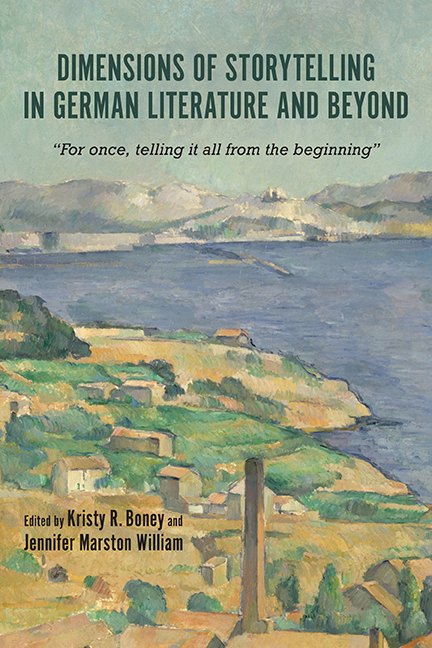 Dimensions of Storytelling in German Literature and Beyond
Dimensions of Storytelling in German Literature and Beyond from Part II - Expressions of Modernity: Using Storytelling Unconventionally
Published online by Cambridge University Press: 12 April 2019
FROM 1938 to 1941, between 17,000 and 20,000 European Jewish refugees fled the Nazi terror to the Chinese harbor city Shanghai, the only place that did not enforce requirements for travel or immigration documents, because of the so-called “International Settlement” that was established by the British and French colonial powers. In 1943 the Japanese occupation authority forced the Jewish refugees in Shanghai to move to a restricted area in the city, known as the “Designated Area for Stateless Refugees,” and often referred as the “Shanghai Ghetto.” Thus the refugees’ hope to use Shanghai as a temporary waiting room for their transfer to North America or elsewhere was shattered. They ended up spending a decade in China, during which time their quest for a culturally enriching life brought to fruition numerous Jewish writings on China.
One notable example is Willy Tonn, a German-Jewish émigré who during his exile in China from 1939 to 1949 contributed numerous articles to German-Jewish newspapers and English periodicals published in Shanghai. His experiment with a literary hybrid of various intercultural and interreligious elements resulted in several mythical narratives—legends, parables or tales—published in Shanghai's major English newspapers.
In this essay I investigate the aesthetic apparatus in Tonn's reinvention of “Chinese” tales that incorporate diverse European and Asian cultural elements. My aim is threefold. First, from a hermeneutic perspective, I will illustrate how Tonn's storytelling strives for an aesthetic synthesis of Western and Eastern mythological narratives, which was in line with the search for interreligious, cultural Synthese (synthesis) in the spirit of Jewish renewal, a cultural movement during the Weimar Republic. Second, my intertextual analysis will reveal that Tonn's narrative can be seen as a playful experiment of transtextuality that transcends the discourse of originality concerning fictions dealing with transnational mythological themes. Finally, adopting a transcultural angle, I will argue that Tonn's writing encompasses Martin Buber's notion of the oriental spirit of Judaism.
Willy Tonn and China
Willy Tonn was born on January 28, 1902 in a German-Jewish family in Berlin. In 1920 he became a student at the Friedrich Wilhelm University Berlin. From the summer semester 1921–22 to the winter semester 1924, Tonn completed a total of seventeen Chinese courses taught by renowned Sinology scholars such as Erich Schmitt (1893–1955), Erich Haenisch (1880–1966), and Otto Franke (1863–1946).
To save this book to your Kindle, first ensure no-reply@cambridge.org is added to your Approved Personal Document E-mail List under your Personal Document Settings on the Manage Your Content and Devices page of your Amazon account. Then enter the ‘name’ part of your Kindle email address below. Find out more about saving to your Kindle.
Note you can select to save to either the @free.kindle.com or @kindle.com variations. ‘@free.kindle.com’ emails are free but can only be saved to your device when it is connected to wi-fi. ‘@kindle.com’ emails can be delivered even when you are not connected to wi-fi, but note that service fees apply.
Find out more about the Kindle Personal Document Service.
To save content items to your account, please confirm that you agree to abide by our usage policies. If this is the first time you use this feature, you will be asked to authorise Cambridge Core to connect with your account. Find out more about saving content to Dropbox.
To save content items to your account, please confirm that you agree to abide by our usage policies. If this is the first time you use this feature, you will be asked to authorise Cambridge Core to connect with your account. Find out more about saving content to Google Drive.